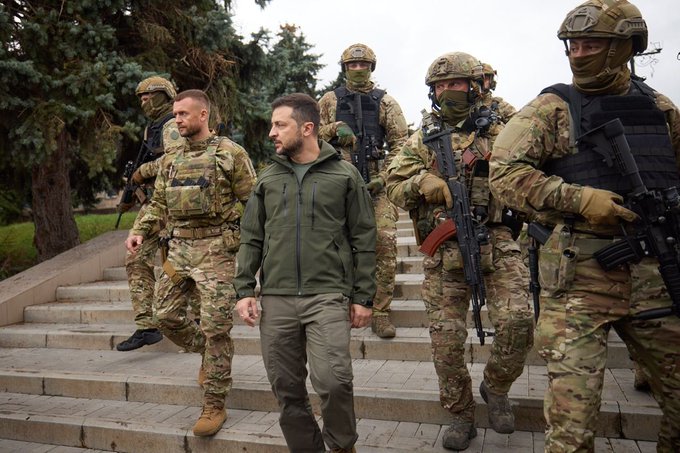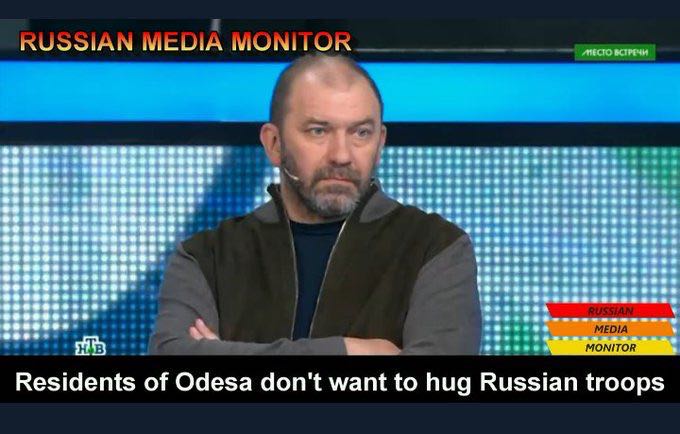How to read Russian society's response to the war? According to sociologist Greg Yudin there are three distinct groups in Russia: 'radicals, dissenters and laymen'. Extreme right radicals want the war to be intensified; dissenters are categorically opposed to the war and totally depressed. The 'laymen' consists of the depoliticized passive majority. Yudin believes Putin will not be able to sell a defeat in Ukraine as a victory. But a full military mobilization seems equally unlikely now.
 Shortly after the recapture of Izyum president Zelensky visited the devastated town (picture twitter)
Shortly after the recapture of Izyum president Zelensky visited the devastated town (picture twitter)
by Greg Yudin
The radicals (15-25% of Russians) constitute a sizeable but extremely loud minority that actively supports war, is engaged, follows the news and in rare cases even goes to the frontlines. This is the audience of the military bloggers, Telegram channels and vampires like Solovyov or Skabeeva [TV presenters and propagandists Vladimir Solovyov and Olga Skabeeva, ed.]. The dissenters, conversely, are a sizeable minority that categorically opposes the war. It is banned from Russian-based media and generally depressed (20-25%). Finally, the laymen consist of the passive majority that is completely depoliticized and doesn’t want to have anything in common with politics and the war (50-65%).
Laymen are the bulk of yeah-sayers when asked 'Do you support the President’s decision to conduct the special military operation or are you a national traitor to be put in prison for 15 years?'
The laymen are those who are carelessly enjoying their lives while people are dying in Ukraine. It is obviously deplorable but the upside of it is that these people are completely unwilling to participate in war actively in any way.
Laymen try to shield themselves from any news about war as hard as they can and know very little about the defeat in Kharkiv (many of them wouldn’t even be able to tell where Kharkiv is located). The mainstream radio and TV news are protecting them from this information.
Importantly, as TV started promoting hard war propaganda, the viewership went down. Precisely because laymen want their soap operas, nutritionists, and standup, rather than boring news from the frontlines.
Radicals
Conversely, the radicals are seriously affected by the Ukrainian counter-offensive. They exploded in finger-pointing and blaming the military leadership, each other, and even Putin for this defeat. For the first time, there is a heated discussion between them.
There is a variety of tones in this discussion – from relatively optimistic: 'we should unite around Putin and take revenge' to completely fatalistic: 'the war is lost, no matter what'. But: all of them demand total mobilization of Russian society and more aggressive war.
They are united by the belief that Russia would have easily conquered Ukraine, but for some reason (treason, incompetence, generosity) it wages the war with one hand tied on its back.
However, this discussion is significant. For the first time people start realizing that Putin is not invincible. It is hard to overestimate how important this myth is for Russia. Belief that Putin will prevail no matter what paralyzes all independent action in the country.
The radicals are getting angry at the laymen for continuing with their normal life as troops are dying for the survival of the country under NATO’s assault. The laymen are angry at the radicals for trying to politicize their lives, like introducing war propaganda to schools.

Open criticism on TV
I have seen people taking Boris Nadezhdin’s statements on Russian TV as a sign of a crack in the dominant narrative. This is not the case. [Nadezhdin was talking openly about the heavy losses, the defeat and the need for general mobilisation; he praised the Ukrainian army. Later anchor man Solovyov asked him to be thrown in jail for that - ed.]
Nadezhdin is an old liberal from the 90s, a comrade of [the murdered opposition politician] Boris Nemtsov. Nemtsov decided to mount a real opposition to Putin (with a dismal outcome). Nadezhdin opted for playing along Putin’s rules of fake opposition and joined one of his puppet parties.
The benefit of this strategy is that you are regularly invited to these shitshows as a strawman to be humiliated. This is how you gain national recognition, and it helps on the election day.
However, Nadezhdin himself was obviously against this war from day one, and he is clearly against Putin, too – this is just something you cannot say openly on Russian TV. There was no change at all in his attitudes because of the recent setbacks.
The brave statements of local MPs calling to impeach Putin are no sign of change either. They belong to the dissenters and protested against the war as much as they could. This call is a farewell gesture – last week their term ended, many of them were not even allowed to run.
Putin has problems
Still, the current situation puts Putin in a precarious position. He is dependent both on the passivity of the laymen and the engagement of the radicals. That’s why he sells two contradictory narratives – one about an existential war and another about things running as usual.
The radicals’ demand for total mobilization is totally unacceptable for the laymen. However, the defeats on the frontlines make Putin’s reluctance to put the country on wartime footing unacceptable for the radicals.
Putin’s strategy has been a form of targeted mobilization – recruiting people among the radicals while leaving the laymen to their own devices. There is some room for him to continue with that strategy, but military defeats will make it increasingly strained.
Putin is unlikely to yield to demands to declare mobilization now. It requires political mobilization first. Now is a bad moment. Even volunteers would chose to go to Ukraine to join a winning army and earn some dollars, but not to face a strong opponent. The draftees will be even less enthusiastic.
To sum up, balancing between depoliticizing society in general and mobilizing the radical part of it simultaneously will be increasingly difficult for Putin as a major defeat is looming.
Can Putin sell a defeat as a victory? No. The radicals will not hesitate calling it a defeat, but the laymen will not forgive him the disruption of their dayly life.
The conclusion is: Putin will not survive a military defeat in a war where he has put the whole country at stake.
This article is a slightly edited version of a thread on Greg Yudin's Twitter.
